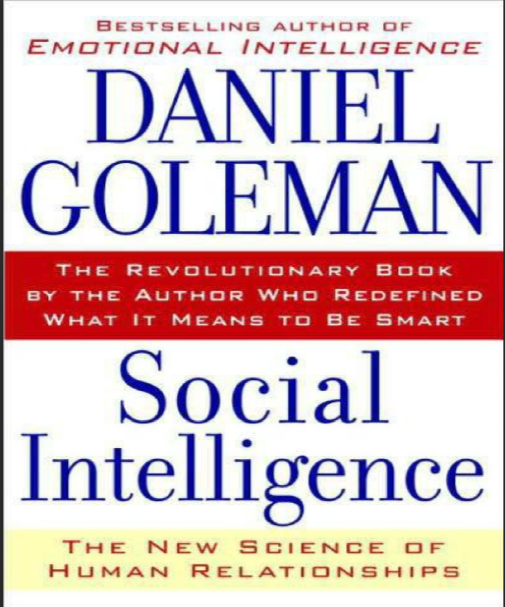Social Intelligence: The New Science of Human Relationships
Digital
New
Free
In stock
0 Reviews
Social Intelligence by Daniel Goleman is a groundbreaking exploration into how our interactions with others shape our brains, emotions, and even our physical health. It builds on Goleman’s earlier work on Emotional Intelligence, but shifts the focus from internal emotional awareness to how we connect with others.
Core Concept
Goleman proposes that social intelligence is a crucial component of human intelligence. It includes:
Social awareness – the ability to sense others’ feelings and perspectives.
Social facility – the skill to navigate social situations smoothly.
He argues that our brains are biologically wired for connection, and these connections have real physiological impacts—affecting everything from stress levels to immune system strength.
Key Insights from the Book
The Brain Is Social
Human brains are designed for interaction. Goleman introduces the concept of “neural Wi-Fi,” where emotions are contagious and we influence each other on a neurological level.
Mirror Neurons
These are brain cells that activate both when we act and when we observe someone else act, forming the basis of empathy.
Attachment and Love
Close relationships, especially in early life, shape brain development. Positive social interactions enhance brain function and emotional resilience.
Toxic vs. Nourishing Relationships
Chronic exposure to hostile or stressful relationships can damage health, while warm, supportive connections can improve well-being.
Social Intelligence in the Real World
Goleman explores its application in leadership, education, parenting, and even business—emphasizing how empathy and relationship management are key to success.
Why It Matters
Social intelligence is trainable and just as important as IQ.
It enhances personal relationships, teamwork, and leadership.
It highlights the biological need for connection in a digitally isolated age.
Takeaway
“Even the briefest interactions can alter a person’s mood, outlook, and even biology.” — Daniel Goleman
Social intelligence is not just about being nice — it’s a vital, science-backed form of intelligence that shapes who we are and how we thrive in the world.
Core Concept
Goleman proposes that social intelligence is a crucial component of human intelligence. It includes:
Social awareness – the ability to sense others’ feelings and perspectives.
Social facility – the skill to navigate social situations smoothly.
He argues that our brains are biologically wired for connection, and these connections have real physiological impacts—affecting everything from stress levels to immune system strength.
Key Insights from the Book
The Brain Is Social
Human brains are designed for interaction. Goleman introduces the concept of “neural Wi-Fi,” where emotions are contagious and we influence each other on a neurological level.
Mirror Neurons
These are brain cells that activate both when we act and when we observe someone else act, forming the basis of empathy.
Attachment and Love
Close relationships, especially in early life, shape brain development. Positive social interactions enhance brain function and emotional resilience.
Toxic vs. Nourishing Relationships
Chronic exposure to hostile or stressful relationships can damage health, while warm, supportive connections can improve well-being.
Social Intelligence in the Real World
Goleman explores its application in leadership, education, parenting, and even business—emphasizing how empathy and relationship management are key to success.
Why It Matters
Social intelligence is trainable and just as important as IQ.
It enhances personal relationships, teamwork, and leadership.
It highlights the biological need for connection in a digitally isolated age.
Takeaway
“Even the briefest interactions can alter a person’s mood, outlook, and even biology.” — Daniel Goleman
Social intelligence is not just about being nice — it’s a vital, science-backed form of intelligence that shapes who we are and how we thrive in the world.
Social Intelligence by Daniel Goleman is a groundbreaking exploration into how our interactions with others shape our brains, emotions, and even our physical health. It builds on Goleman’s earlier work on Emotional Intelligence, but shifts the focus from internal emotional awareness to how we connect with others.
🧠 Core Concept
Goleman proposes that social intelligence is a crucial component of human intelligence. It includes:
Social awareness – the ability to sense others’ feelings and perspectives.
Social facility – the skill to navigate social situations smoothly.
He argues that our brains are biologically wired for connection, and these connections have real physiological impacts—affecting everything from stress levels to immune system strength.
🔬 Key Insights from the Book
The Brain Is Social
Human brains are designed for interaction. Goleman introduces the concept of “neural Wi-Fi,” where emotions are contagious and we influence each other on a neurological level.
Mirror Neurons
These are brain cells that activate both when we act and when we observe someone else act, forming the basis of empathy.
Attachment and Love
Close relationships, especially in early life, shape brain development. Positive social interactions enhance brain function and emotional resilience.
Toxic vs. Nourishing Relationships
Chronic exposure to hostile or stressful relationships can damage health, while warm, supportive connections can improve well-being.
Social Intelligence in the Real World
Goleman explores its application in leadership, education, parenting, and even business—emphasizing how empathy and relationship management are key to success.
📈 Why It Matters
Social intelligence is trainable and just as important as IQ.
It enhances personal relationships, teamwork, and leadership.
It highlights the biological need for connection in a digitally isolated age.
🔑 Takeaway
“Even the briefest interactions can alter a person’s mood, outlook, and even biology.” — Daniel Goleman
Social intelligence is not just about being nice — it’s a vital, science-backed form of intelligence that shapes who we are and how we thrive in the world.
0 Comments
0 Shares
487 Views
0 Reviews





